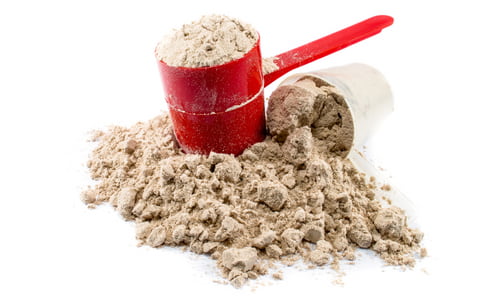Mass Gainer vs Whey Protein
“Mass Gainer vs Whey Protein” was written by Shannon O’Rourke & edited/reviewed by Aly Bouzek, MS, RDN. Shannon is a dietetic intern at the University of Northern Colorado.
There is much debate over whether mass gainer vs whey protein is the better option when looking for a replacement meal or lunch time snack. Both supplements provide protein, carbohydrates, fats, and beneficial nutrients in just one scoop.

What is a Mass Gainer?
A mass gainer is a protein powder supplement that helps you increase your calories while also promoting muscle gain, and ultimately, weight gain.
A mass gainer helps you “bulk” up your gain weight by providing
A high amount of:
- Calories
- Protein
- Carbohydrates
A low amount of:
- Fat
What is Whey Protein?
Whey protein is an animal-based protein that comes from milk. This protein is often found as a dietary supplement in powder form.
Whey protein has branched chain amino acids (BCAAs) that help boost your immune system while also promoting lean muscle growth.
Whey protein provides
A high amount of:
- Calories
- Protein
A low amount of:
- Carbohydrates
- Fat
Check out our article on Whey Protein for Weight Gain to learn 9 benefits of whey protein.
Benefits of Protein
Protein is seen as the building blocks of life itself. Composed of 20 amino acids, it’s excellent at transporting molecules throughout your body, protecting your body from harmful bacteria, as well as helping repair your cells and creating new cells.
Most commonly noticed in the benefit of weight-lifting, protein repairs muscles and keeps muscles and bones strong. As you age, your bones become brittle and weak.
To prevent muscle loss, supplementing protein in your diet can help keep you feeling strong and healthy as you get older.
Recommended Protein Per Day
For older adults, aged 65 years and older, it’s recommended to get 1.0-1.2 grams of protein per kilogram of body weight every day. (1)
Protein Sources
There is a wide array of protein sources to choose from in your day-to-day life.Some are animal sources and others come from plant-based foods.
Animal protein sources:
- Beef
- Chicken
- Fish
- Turkey
- Eggs
- Whey
Plant-based protein sources:
- Black beans
- Lima beans
- Oats
- Seeds
- Quinoa
- Chickpeas
- Nuts and nut butters
When Should You Choose a Mass Gainer vs Whey Protein?
Choosing a mass gainer vs whey protein is comparable to eating a whole meal or eating only a partial meal. Follow along as we explain below!
Mass gainers are known to have more vitamins and minerals as well as other macronutrients to give you a full balanced snack or meal. They are loaded with calories, protein, and carbohydrates.
*Note, this section includes an affiliate link. As an Amazon Associate I earn from qualifying purchases.
For a mass gainer example, 1/2 scoop of Optimum Nutrition Gold Standard Pro Gainer* (Double Chocolate flavor) offers:
- 325 calories
- 30 gm protein
- 40.5 gm carbohydrate
- 4.5 gm fat
- 2.5 gm fiber
A standard whey protein shake, for example one scoop/serving of Optimum Nutrition Gold Standard 100% Whey Protein Powder* (Double Rich Chocolate flavor) offers:
- 120 calories
- 24 gm protein
- 3 gm carbohydrate
- 1.5 gm fat
- <1 gm fiber
- BCAAs

While there is a huge benefit to consuming protein and BCAA’s, you may be lacking carbohydrates and fats to balance out your meal if you choose whey protein.
When buying a whey protein powder, pair it with healthy carbohydrates and fats to give you a well balanced meal. For example, enjoy a whey protein shake with a banana and peanut butter.
A mass gainer will benefit you when you don’t have access to a complete meal. It can still provide you with a healthy balance of nutrition.
Mass Gainer vs Whey Protein: What Makes up a Mass Gainer?
Mass gainer is a supplement for those who are looking to gain weight and build mass on their body.
The main objective of a mass gainer is to pack on calories while also combining healthy macronutrients (protein, carbs, and fat) to mirror what a meal should be composed of.
Mass gainers are composed of 30-125g of carbs, 20-50g of protein and 3-15g of fat. There are a variety of proteins and carbohydrate sources chosen for mass gainers.
Eating a healthy balanced diet while supplementing a mass gainer into one of your meals would be a great way to add more calories while also getting enough vitamins and nutrients that your body needs!
High Quality Mass Gainer
There are many mass gainers on the market that range from low quality to high quality ingredients. When choosing a mass gainer always look at the ingredients.
High quality protein sources in mass gainers:
- Pea protein isolate (for lactose-intolerant)
- Egg protein isolate (for lactose-intolerant)
- Whey protein
- Whey protein isolate
High quality carbohydrate sources:
- Sweet potato powder
- Oat powder
- Brown rice flour
Mass Gainer vs Whey Protein: What Makes up Whey Protein?
Whey protein generally consists of a combination of proteins isolated from whey. You will mostly find whey in the watery part of milk.
This byproduct of milk is used in cheese production and what used to be just a liquid part of a yogurt is now highly sought after for muscle gain and keeping bones strong.
Whey protein is loaded with branched chain amino acids (BCAA’s) which have been shown to improve lean muscle growth and help with repairing body tissue.
Whey Protein Types
There are two kinds of whey protein and they depend on how much the protein is processed. (2)
- Whey protein isolate:
- Is more processed
- Has less lactose
- Is more than 92% pure protein
- Whey protein concentrate:
- Is less processed
- Keeps most of its lactose
- Is 35% to 80% pure protein
If you are lactose intolerant, then there are other protein options you can choose from.
Mass Gainer vs Whey Protein: Which is Best?
Both mass gainer and whey protein have their benefits. It depends on you, your health, and your individual goals as to which is best for you.
If you find that you’re not getting enough calories, protein, and carbohydrates to maintain your body weight, then adding a mass gainer to one of your meals could provide benefits.
If you are needing to simply increase your calories and protein, then adding a whey protein to your diet will encourage stronger bone density and help with lean muscle growth.
As always, please speak with your doctor or a registered dietitian before changing your diet.
Resources:
- Bauer J, Biolo G, Cederholm T, et al. Evidence-based recommendations for optimal dietary protein intake in older people: a position paper from the PROT-AGE Study Group. Journal of The American Medical Directors Association. 2013;14(8):542-59.
- Chapter 15: Whey Processing. Dairy Processing Handbook. https://dairyprocessinghandbook.tetrapak.com/chapter/whey-processing.
